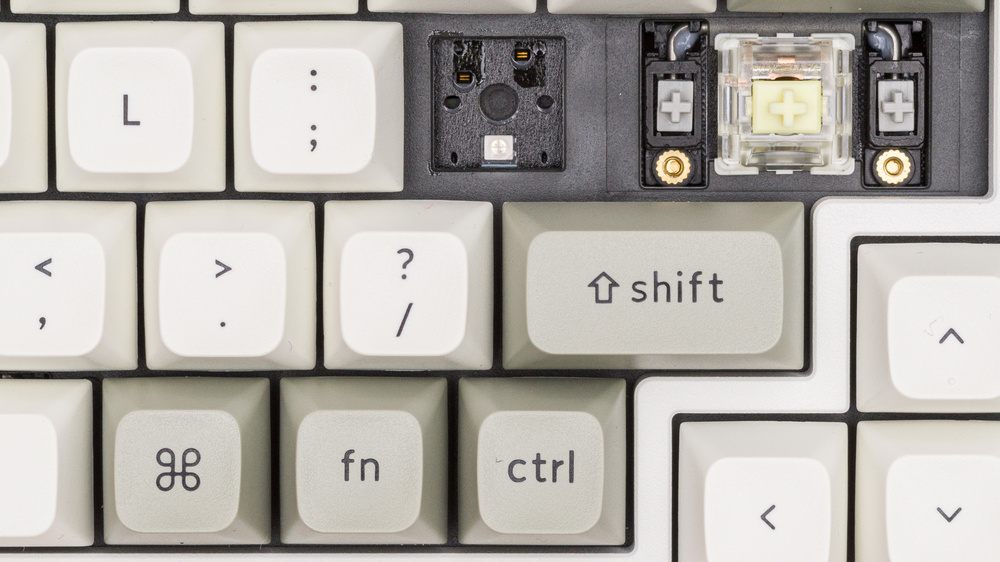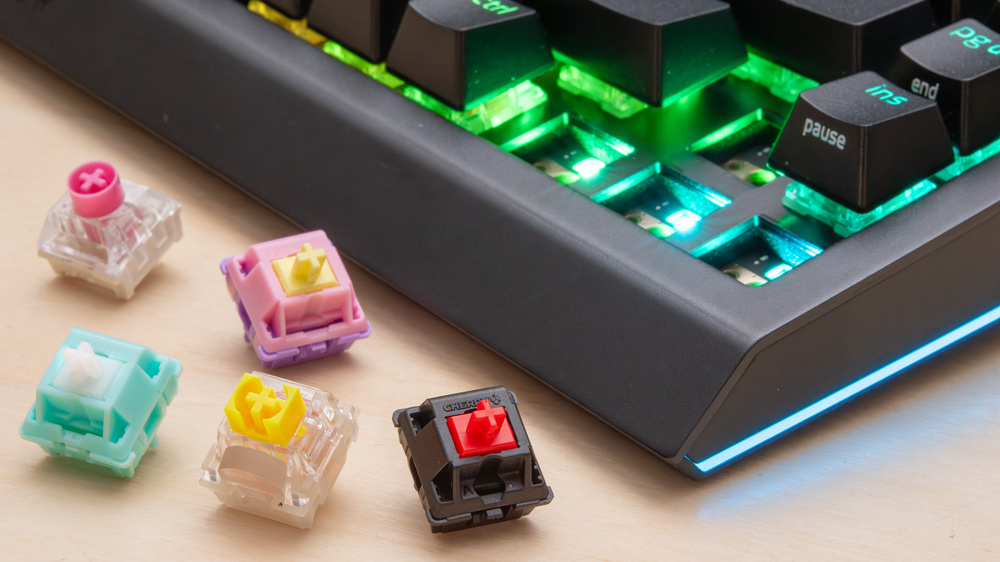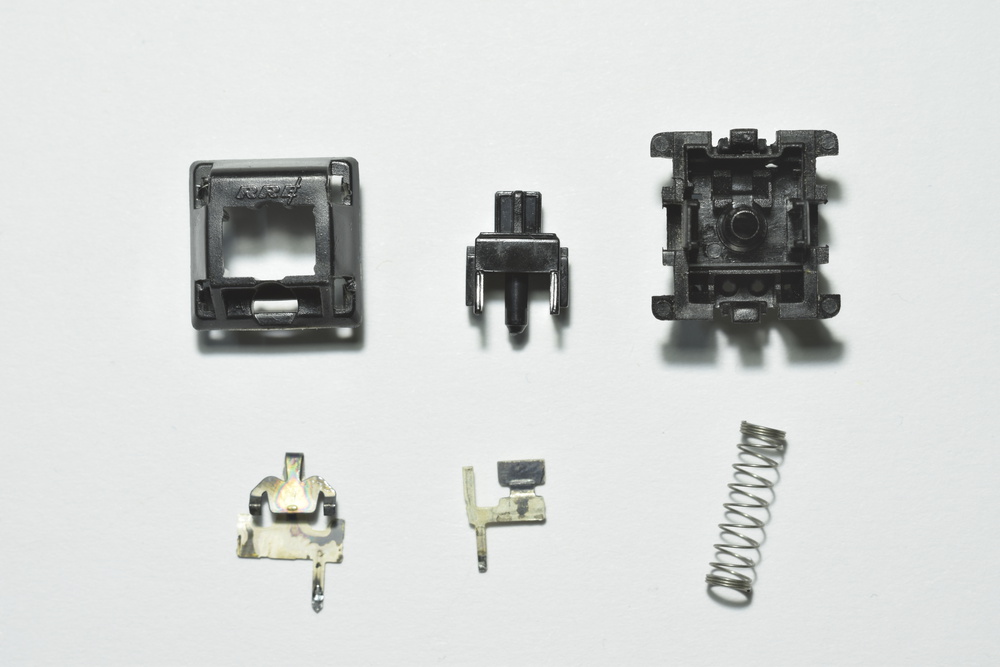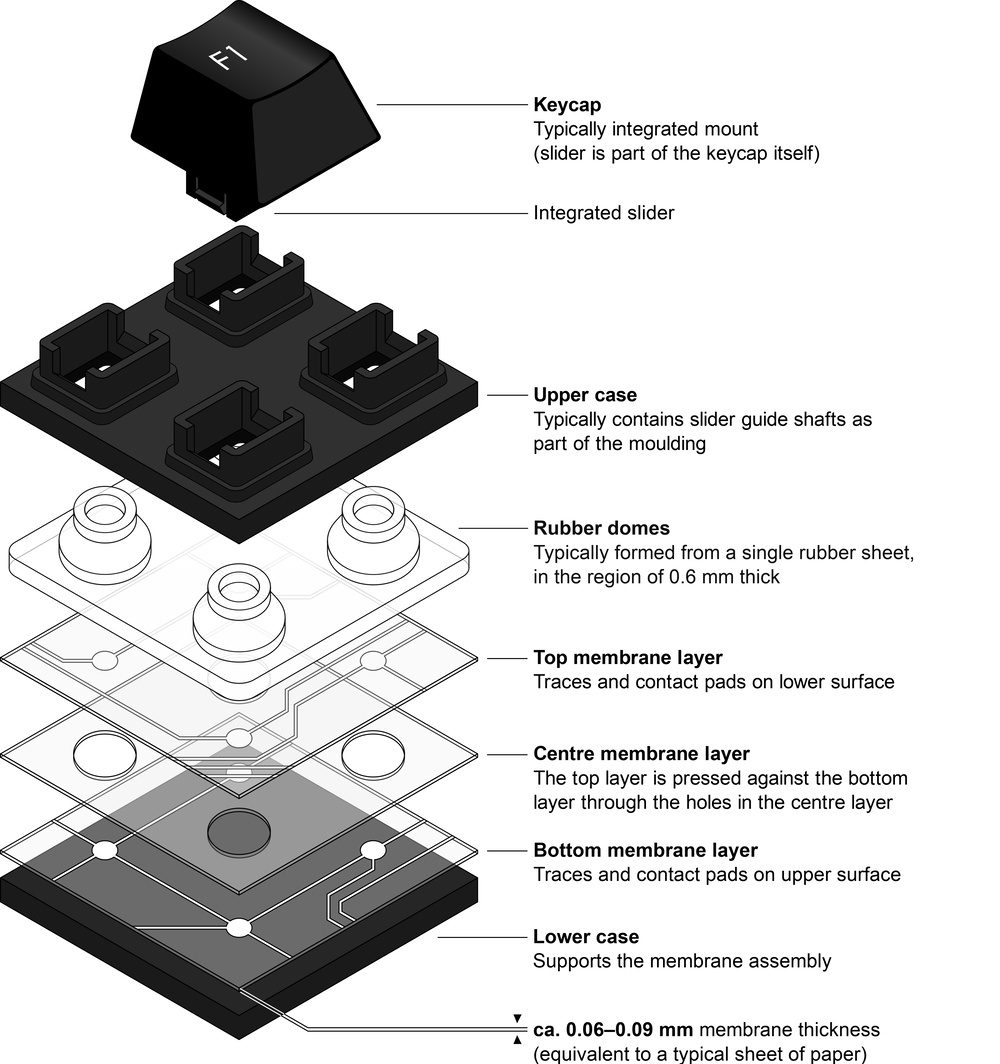Mechanical and membrane keyboards use different technologies to register keystrokes, each with distinct advantages and trade-offs. Whether you're prioritizing typing feel, noise levels, or longevity, understanding these differences can help you decide whether a membrane vs. mechanical keyboard is the better fit for your needs. We've tested over 250 keyboards in our lab and put together this guide to compare mechanical and membrane models across areas like feel, sound, durability, and performance.
What Is A Mechanical Keyboard?
A mechanical keyboard uses individual mechanical switches under each key. When you press a key, it brings metal contacts together to complete an electrical circuit, sending a keystroke signal to your computer.
Note: Some newer switches use optical or magnetic actuation in place of metal contacts. While optical and magnetic switches are grouped with mechanical keyboards, this article focuses on conventional mechanical switches that use switch designs with discrete physical components and metal contact actuation (ex, Cherry MX-style switches).
Typing Feel
Mechanical switches come in three primary types: linear switches, which provide a smooth keystroke with no tactile feedback; tactile switches, which have a noticeable bump during key travel; and clicky switches, which are essentially tactile switches with an added mechanism that produces an audible clicking sound. Within each category, there's a wide range of options that differ in actuation force, feedback, travel distance, and other characteristics. These differences can either significantly or subtly affect the typing experience.

Sound
Mechanical keyboards are typically louder than membrane keyboards, but they offer a wide range of sound profiles depending on factors like case material, plate material, and switch type, as well as dampening treatments and switch or stabilizer lubrication. Older or lower-cost mechanical keyboards can sound rattly or hollow, while many newer designs incorporate layers of acoustic dampening to reduce noise and create intentional sound profiles. Linear switches can be among the quietest, tactile switches are typically slightly louder, and clicky switches are the loudest and frequently discouraged for open office environments.
Within each switch category, there is a broad variety of sound profiles. Some switches produce deeper "thocky" sounds, while others sound brighter and more "clacky." Specialized silent switches are also available, designed to minimize noise during both actuation and bottom-out. These switches, when paired with effective dampening, can produce a typing experience nearly as quiet as that of a membrane keyboard.
To appreciate the difference, compare a typing video of the Razer BlackWidow V4 Pro with clicky Razer Green switches to a video of the NuPhy Gem80 with Cherry Silent Red Clear-Top switches and extensive sound-dampening layers inside the board. The contrast in sound is significant.
|
Razer BlackWidow V4 Pro with clicky Razer Green switches. |
NuPhy Gem80 with Cherry Silent Red Clear-Top switches. |

Durability
Do mechanical keyboards last longer than membrane keyboards?
Typically, yes. Mechanical keyboards have a durability advantage. Their switches are often rated for 50 to 100 million keystrokes, making them significantly more robust than the rubber domes used in most membrane keyboards. However, these ratings aren't guarantees. They serve as a general estimate of expected lifespan under normal use. Actual longevity also depends heavily on the build quality of other components, including the case, PCB, stabilizers, and solder joints.
How long do mechanical keyboards last?
That depends on build quality and your usage, but with proper care, a good mechanical keyboard can easily last several years or even longer.
Another key advantage of mechanical keyboards is their repairability and aftermarket customizability. Most models allow you to replace keycaps and stabilizers. With some soldering experience, you can also replace switches. This process is even easier with hot-swappable designs, which let you pop switches in and out without soldering and are becoming increasingly common. These features not only extend the usable life of the keyboard but also open the door to deep personalization.

Price
Mechanical keyboards are typically more expensive than membrane keyboards, but prices can vary widely. Budget models are available for under $100, while very high-end custom builds can cost up to $500 or more.
Gaming Performance
Mechanical keyboards are widely preferred for gaming due to the consistency and responsiveness of their switches. In addition, mechanical keyboards often have better matrix scanning and more efficient firmware-level processing, designed for competitive gaming. This results in much lower and more consistent input latency compared to membrane models. Virtually all modern mechanical keyboards also support N-Key Rollover (NKRO), allowing any number of simultaneous key presses to register without ghosting or dropped inputs.
Because switch characteristics vary widely, some switches are specifically optimized for gaming. These are typically lightweight and have short pre-travel distances to help register keystrokes more quickly. For some examples, check out our recommendations for the best mechanical switches for gaming.
What's A Membrane Keyboard?
Membrane keyboards use a flexible, pressure-sensitive membrane layer to register keystrokes. When you press a key, it pushes a rubber dome or conductive pad through the membrane layers, completing the electrical circuit and sending a keystroke signal to your computer.

Typing Feel
Membrane keyboards don't have different switch types like mechanical switches. They provide soft resistance through rubber domes, which can feel vaguely tactile but lack precision and consistency. Many users describe the typing feel of membrane keyboards as "mushy."
Sound
Membrane keyboards are generally quieter than mechanical keyboards, making them a popular choice for shared or noise-sensitive environments like offices. Their rubber dome or membrane-based actuation produces a soft, muted sound. For example, see a typing demonstration of the Dell KB216, a typical low-cost membrane keyboard, below.
Durability
Membrane keyboards tend to have a shorter lifespan than mechanical keyboards. The rubber domes or membrane sheets used for actuation tend to wear out over time, especially with heavy or prolonged use. Most are rated for around 5 to 10 million keystrokes, which is sufficient for light to moderate usage but falls short of the durability offered by mechanical switches. Because the components aren't modular, membrane keyboards are difficult to repair and typically must be replaced when a key fails.
That said, they can offer some protection against minor liquid spills and debris. The absence of separate moving parts and the membrane's layered construction provide a semi-sealed design. However, membrane keyboards are not inherently waterproof. Only certain models (typically reserved for industrial or specialized environments) are engineered for full water resistance, but these aren't commonly consumer-grade options.
Price
Membrane keyboards are generally much more affordable than mechanical keyboards. Their simpler construction and lower manufacturing costs make them a popular choice for casual use, basic office work, or more temporary or occasional setups. Some of the simplest wired membrane keyboard models are regularly under $30, while even more expensive models with wireless connectivity or RGB backlighting are typically under $100.
Gaming Performance
Most membrane keyboards are generally less suited for gaming compared to mechanical keyboards. They often have higher latency and less responsive-feeling keys, which can impact performance in fast-paced or competitive games. Most membrane keyboards also don't support NKRO (N-Key Rollover) and more often only support 6KRO, meaning multiple simultaneous key presses may not register correctly.
That said, some dedicated gaming-oriented membrane keyboards like the SteelSeries Apex 3 or the Razer Cynosa V2 may have features like improved scanning, better firmware, or hybrid mechanical domes to help close the performance gap somewhat. They also frequently have RGB backlighting, although this is typically zone-lighting, which just means that there isn't per-key backlighting as is more typical on more expensive mechanical keyboards.
Ultimately, for casual gaming, a membrane keyboard is more than sufficient, but more competitive players typically prefer the speed, precision, and latency advantage of mechanical keyboards.
Are Mechanical Keyboards Better Than Membrane Keyboards?
Use the table below for a quick comparison of the pros and cons of a mechanical vs membrane keyboard.
| Mechanical Keyboards | Membrane Keyboards | |
|---|---|---|
| Pros |
More consistent and precise key feel Wide switch variety Longer lifespan (50–100+ million keystrokes) Most models are repairable with basic soldering skills, and some are hot-swappable NKRO and better latency performance for gaming Highly customizable (keycaps, cases, switches, etc.) |
Less expensive Quieter Lightweight Somewhat more resistant to liquid spills and debris build-up Typically have lower-profile designs, which can be more comfortable for extended typing without a wrist rest |
| Cons |
Generally more expensive Louder (especially clicky switches) Heavier and bulkier May require modding to achieve ideal sound/feel Higher-profile designs may require a wrist rest for optimal comfort and ergonomics |
Mushy or inconsistent key feel Shorter lifespan (typically 5–10 million keystrokes) Limited rollover support and worse latency for gaming Not typically repairable Limited switch variety and no customization |
Conclusion
At the end of the day, neither keyboard type is universally better. They each have specific advantages to suit different needs.
Do mechanical keyboards last longer? Generally, yes. They also often offer better performance and more customization. They're ideal for gamers, typists, and users who want a consistent and satisfying feel. However, they're also louder, more expensive, and frequently bulkier.
Are membrane keyboards quieter? In almost all cases, yes. They're also typically more affordable and simpler. They're perfectly adequate for basic typing, office work, or casual gaming, and they're a great fit for shared or noise-sensitive spaces.
For long-term reliability and performance, mechanical keyboards are a good investment. For low-cost, plug-and-play functionality, membrane keyboards still have a place.
